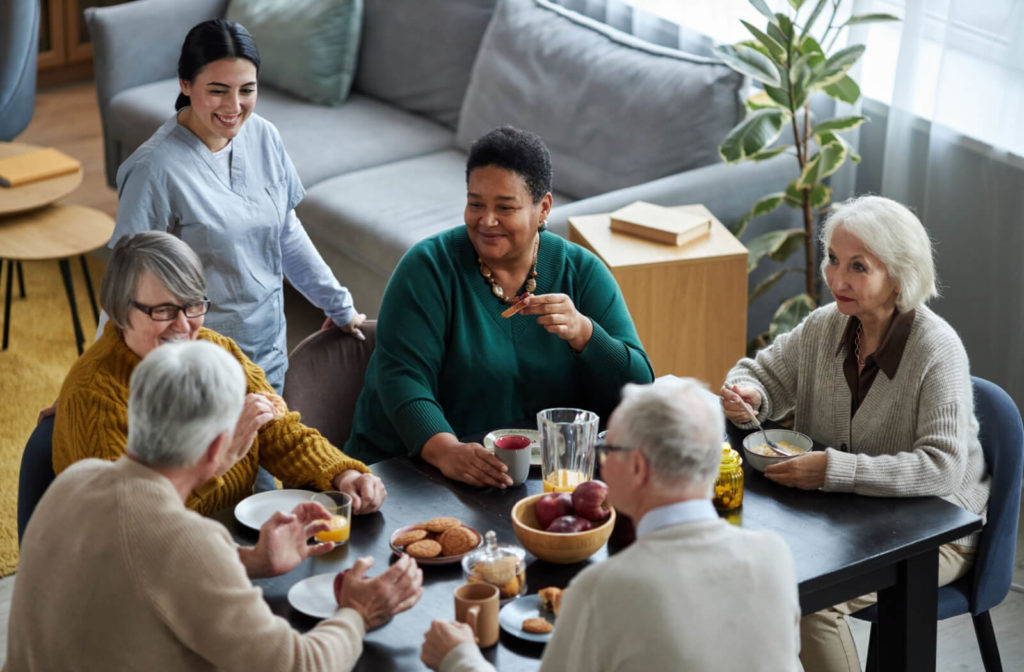Get specialized attention with professional Memory Care services.
How Helped Living Facilities Enhance Quality of Life for Those With Dementia
The combination of engaging programs and family members participation further enhances the locals' experience. The intricacies of mental deterioration treatment proceed to progress, motivating a more detailed examination of how these facilities adjust and introduce to fulfill the obstacles encountered by homeowners and their families.
Personalized Care Program
(Dementia Care Charlotte)Oftentimes, individuals with dementia need tailored support that addresses their special requirements and choices. Personalized care plans are vital in assisted living settings, as they make sure that each resident gets proper focus and solutions. These strategies are established collaboratively, including medical care specialists, caretakers, and household members to produce an extensive summary of the individual's medical background, cognitive capacities, and individual rate of interests.
A well-structured individualized care plan generally includes specific objectives connected to health and wellness monitoring, everyday activities, and social interaction. It represents the person's cognitive decline while advertising self-reliance and self-respect. Routine evaluations and updates to the care strategy are crucial, as they permit adjustments based upon the homeowner's progressing problem and preferences.
Trick elements of these plans often entail medicine administration, behavioral assistance methods, and nutritional standards tailored to the individual's demands (Assisted Living). By concentrating on individualized care, aided living facilities can foster an encouraging atmosphere that enhances the top quality of life for individuals with mental deterioration, eventually adding to their general health and joy. This individualized approach respects the uniqueness of each resident, guaranteeing they obtain the compassionate treatment they require

Engaging Activities and Programs
Involving homeowners in significant activities and programs is important for enhancing the lifestyle for people with dementia. These activities not just supply satisfaction however additionally stimulate cognitive function and advertise social communication, which can mitigate sensations of seclusion typically experienced by residents.

Additionally, tailored programs are important in ensuring that each citizen's distinct choices and capabilities are recognized. This tailored approach urges involvement, enhances self-worth, and gives a feeling of success.
Furthermore, regular evaluations of homeowners' interests can help team modify and adjust activities to far better fit evolving demands. By prioritizing interesting activities and programs, helped living facilities can substantially improve the general experience and psychological health and wellness of people living with mental deterioration.
Safe and Encouraging Environment
Creating a secure and supportive atmosphere is important for people more with dementia, as it directly affects their health and lifestyle. Aided living facilities are created with certain attributes that advertise safety and security while promoting a sense of protection and convenience. These environments focus on ease of access, with designs that minimize confusion and motivate freedom, enabling residents to browse their surroundings extra quickly.
Precaution, such as secure entrances and leaves, protect against wandering and unauthorized gain access to, which are essential considerations for people with mental deterioration (Memory Care). Employee are trained to recognize the distinct requirements of citizens, supplying customized support and supervision to guarantee their safety and security. Moreover, the unification of relaxing colors and familiar things can assist lower anxiety and disorientation, developing a more soothing ambience.
Along with physical security, emotional assistance is paramount. Facilities typically use team who are not only proficient in caregiving yet also learnt empathy and interaction, cultivating trust and rapport with residents. This all natural approach contributes to a nurturing atmosphere where individuals really feel valued and comprehended, inevitably boosting their total lifestyle.
Social Interaction and Community
A helpful atmosphere not only prioritizes safety and security but additionally cultivates opportunities for social communication and neighborhood engagement, which are vital for individuals with dementia. In assisted living facilities, organized activities and common areas urge residents to get in touch with each other, reducing sensations of seclusion commonly experienced by those with cognitive impairments.
Social communication plays a considerable function in improving emotional well-being and cognitive feature (Memory Care). Engaging with peers in team tasks such as games, arts and crafts, or workout not only boosts cognitive abilities yet also nurtures a feeling of belonging. Facilities frequently arrange events that advertise socialization, enabling homeowners to develop partnerships and share experiences, which can be specifically advantageous for those with dementia
Additionally, a vibrant neighborhood ambience can enhance the general lifestyle for locals. Personnel are educated to promote communications and assistance homeowners in creating meaningful links. By developing a culture of engagement, assisted living centers help individuals with dementia keep social skills and boost their mood, ultimately contributing to an extra meeting life experience. This community-oriented technique is important in handling the obstacles related to mental deterioration, promoting a feeling of objective and connection for homeowners.
Household Participation and Assistance
Household involvement is critical in sustaining people with mental deterioration in assisted living settings. Proactively engaging family members not only supplies psychological convenience to locals however also fosters a sense of belonging and connection in their lives. When households take part in treatment planning and daily activities, they contribute useful understandings about the individual's preferences, background, and requires, which can boost tailored care.
In addition, regular family check outs can significantly boost the emotional well-being of locals, minimizing sensations of seclusion and anxiousness. Member of the family can also help in preserving cognitive feature by involving their liked ones in acquainted discussions and tasks. This communication enhances individual identification and aids homeowners feel valued and recognized.

Verdict
In verdict, helped living centers considerably boost the high quality of life for individuals with mental deterioration via personalized care strategies, engaging tasks, and a safe environment. Collectively, these aspects create an alternative approach to care that addresses the one-of-a-kind needs of individuals with mental deterioration, advertising general well-being and self-respect.